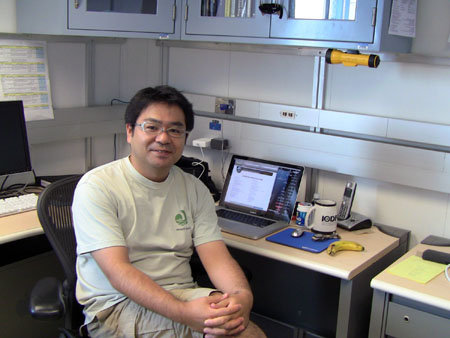
Our Other Co-chief Scientist – Fumio Inagaki
Fumio Inagaki is a microbiologist and is one of the co-chief scientists for Expedition 329. He earned his PhD in molecular genetics and environmental microbiology from Kyushu University in Japan where he studied antibiotics and microbial interactions in the environment.
A turning point in his research focus was when he learned about some problems being encountered at some geothermal electric power plants brought to his attention by a friend who was a geologist. The pipes were being clogged with silicate materials that Fumio thought might be related to microbes. In addition, microbes were being flushed out to streams and eventually to the cold downstream where they often could not survive due to the drastic change in the living environment. This led him to become interested in deep subsurface conditions and the microbes that inhabit them.
Over the years, Fumio has been involved with many areas of research. He worked for JAMSTEC (Japan Agency for Marine-Earth Science and Technology) where he studied deep-sea environments; how life can adapt and survive in such extreme conditions and how life’s activities contribute to environmental changes. In 2006, he spent a year at the Max Plank Institute for Marine Microbiology in Bremen learning about biogeochemistry. He found a remarkable diversity of microbes in deep subseafloor environments.
Fumio has spent a lot of time at sea and has participated in a number of previous drilling expeditions aboard the JOIDES Resolution, such as ODP Leg 201 and IOSP Expedition 301.
Fumio is currently interested in how the deeply buried microbial life in marine subsurface sediments can survive, especially in the deep waters of the Pacific where organic food is extremely limited. This may provide clues as to how life on Earth may have originated and evolved. Do microbes get their energy from hydrogen production or from other inorganic matter? Fumio believes that basic research in the sciences is also important for applied science. This pure research about microbes could provide valuable information for Earth’s carbon cycling related to greenhouse gas and CO2 sequestrations and about the formation and dissolution of methane hydrates, which may be an important source of fuel in the future.
Fumio enjoys his work immensely but he also likes to travel and likes sailing on IODP cruises. When not sailing, he spends quality time with his wife and three children. He has a three and a half year old son and very young identical twin daughters.
